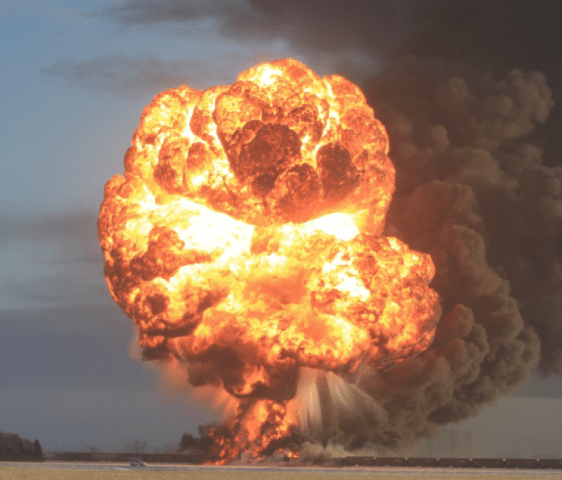On December 30, 2013, a train carrying Bakken crude oil crashed in Casselton, North Dakota resulting in a massive explosion.
In January of 2014, the Pipeline and Hazardous Materials Safety Administration (PHMSA) released their preliminary testing results stating that Bakken crude from North Dakota was more explosive than other crude oils. PHMSA is a part of the Department of Transportation (DOT), the regulatory agency that has ultimate responsibility for any new oil-by-rail regulations.
Then the Wall Street Journal published a study showing the same thing. And now PHMSA has released further data proving this fact — Bakken crude is more volatile and prone to explode. However, the North Dakota Petroleum Council has done a study of their own claiming Bakken crude oil is no different from any other crude oils. And yet, they also include the following disclaimer in their study.
“making the claim that vapor pressure and light ends content correlates to increased ignitability and flammability is a broad statement that without extensive and complicated testing cannot be factually stated or supported”
So, while the industry group spent $400,000 on a study it claims proves Bakken is no different from other oil regarding its ignitability and flammability, they admit they didn’t do the work necessary to confirm their hypothesis is “factually stated or supported.”
At the same time, American Petroleum Institute CEO Jack Gerard, dismissed the PHMSA study as “speculation.”
Of course, the oil industry and North Dakota politicians are not backing down.
North Dakota Agriculture Commissioner Doug Goehring — one of the three people on the North Dakota Industrial Commission who could potentially regulate the local oil industry — accused PHMSA of potentially fabricating its conclusions.
“It almost sounds like they’re trying to make something up,” Goehring said.
North Dakota Attorney General Wayne Stenehjem, another member of the Industrial Commission, also expressed concern.
“They really do seem to be picking on us,” said Stenehjem.
The North Dakota politician’s concern could be due to DOT Secretary Foxx recently saying that there would be a “new world order” when it came to shipping oil by rail.
With these two opposing viewpoints on such an important issue, last week’s meeting in North Dakota between Secretary Foxx and the members of North Dakota’s Industrial Commission could have set the stage for some tense moments. The meeting’s original intent had nothing to do with this issue, but Governor Jack Dalrymple made it clear that he wanted to question Secretary Foxx about the PHMSA report at the meeting.
Reports from the meetings didn’t note tension, but instead stated that both sides were starting to come to an agreement on how they are not going to draw any conclusions from the existing data.
At the meeting Secretary Foxx was not talking about a “new world order” for the oil-by-rail industry. Instead the Bismarck Tribune reported that Foxx said he thought the issue “required more research” and he appeared to downplay the results of the study done by his department.
“We’re seeing some light ends in the Bakken crude that suggest a higher level of volatility than we would see in typical crude. Of course, typical crude is a wide range of different other types of crude.”
Governor Dalrymple also used a softer tone at the meeting, saying that North Dakota would be looking to gather more information via a hearing.
Not everyone believes more research is required on this issue.
Ron Schalow, a Fargo resident who launched a petition to have the state address these issues, told DeSmogblog:
“Instead of concern for the citizens of North Dakota, and those who live, work, or play, close to the rails across the US, the ND Industrial Commission speaks for the Bakken oil producers, who don’t want to spend the money necessary to remove the explosive natural gas liquids from their product before shipping.”
Congressman Ron Kind of Wisconsin, a state that is greatly impacted by the Bakken crude-by-rail, called for the stabilization of oil in a recent letter to the DOT. Congressman Kind explained his reasoning to Wisconsin Public Radio.
“Texas is already doing it. It’s required in all of the pipelines with the oil being transported there. It’s not with the railroads in the Upper Midwest and I’m asking why not? If it is cheap, if it’s easy to do, it’d be another level of safeguard that makes sense to me.”
And other oil processing companies have made it clear that they believe Bakken is more volatile and that stabilization can solve this issue. But they have different profit motives than the people currently pumping volatile Bakken crude into rail cars.
It has been estimated that it would cost several billion dollars to build the stabilization infrastructure for the Bakken oil. In comparison, this is also what the estimates are for what the total costs will be to clean up and rebuild the damage done to Lac Megantic, Quebec by a train full of Bakken crude oil.
However, the oil industry would have to pay for the infrastructure — and they aren’t paying a thing for the Lac-Megantic disaster.
Oil companies certainly aren’t paying for the “complicated and extensive testing” they say would be required to determine if Bakken crude is more volatile than other crude oils.
Of course they could always just listen to what Governor Dalrymple said back in January.
“These exploding tank cars are obviously very powerful and very dangerous.”
Obviously. They are exploding because they are filled with unstabilized, highly volatile Bakken crude oil.
Subscribe to our newsletter
Stay up to date with DeSmog news and alerts







